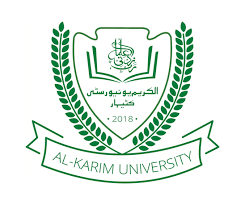General Information
Al-Karim University is a State Private University located in Katihar, Bihar. It was established in 2018 by the Al-Karim Education Trust under the Bihar Private Universities Act, 2013. The university was founded by the same trust that has been managing the well-established Katihar Medical College and Hospital since 1987.
The university is a unitary institution (it does not have other affiliated colleges) and is a Sikh minority institution. Its primary focus is almost exclusively on Medical and Health Sciences education, leveraging the infrastructure and reputation of its long-standing medical college.
Key Recognitions
Type: State Private University (Sikh Minority Institution)
Recognition: University Grants Commission (UGC)
Statutory Approvals: The university's constituent colleges and programs are approved by all relevant national bodies:
National Medical Commission (NMC)
Pharmacy Council of India (PCI)
Indian Nursing Council (INC)
Accreditation: As a university established in 2018, it is in the process of applying for its first NAAC accreditation cycle. Its constituent Katihar Medical College Hospital is NABH (National Accreditation Board for Hospitals) and NABL (for labs) accredited, signifying high-quality standards.
MCI Recogination
Recognized for 60 seats. Recognised for increase of seats from 60 to 100 when degree granted on or after 2018-19.(Previously Under B N Mandal University, Madhepura i.e. upto 2017-18). Permitted for increase of seats from 100 to 150 u/s 10(A) for 2020-21. Permitted for Renewal of 100- 150 seats for the academic year 2022-23. Permitted (3rd renewal) and 4th batch for the Academic Year 2023 - 2024. Annual renewal permission granted for 150 MBBS seats for AY 2024-25.
Campus Facilities
The Campus & Infrastructure
Location: Situated in Karim Bagh, Katihar, Bihar.
Campus Size & Vibe: The university operates from a sprawling 55+ acre campus that integrates its academic blocks and a massive teaching hospital. The environment is professional, academic, and centered on clinical training.
Infrastructure & Facilities:
Constituent Institutes: The campus houses its dedicated colleges for Medicine, Pharmacy, Nursing, and Paramedical Sciences.
Learning Resources: A large, modern central library (on the medical college campus) with over 17,000 books, 40+ national and 40+ international journals, and digital resources (e-books, Medline).
Advanced Laboratories: State-of-the-art labs for all departments, including pre-clinical/para-clinical medical labs, pharmaceutical labs, and nursing skills labs.
Hospital Integration: The Katihar Medical College Hospital is fully integrated into the campus and is the primary training ground.
Residential Life: Separate, secure hostel facilities are available for boys and girls.
Amenities: Auditoriums, seminar halls, canteens, sports facilities, and transportation services.
Hospital & Medical Facilities
Leading tertiary care hospital attached to the institution
Healthcare Hub: Katihar Medical College & Hospital
Healthcare education and delivery are the core identity of Al-Karim University.
Flagship Institute: The Katihar Medical College (KMC) is the premier constituent college of the university.
Teaching Hospital: The university's Katihar Medical College Hospital is a large, 740-bed multi-specialty, tertiary care teaching hospital.
Services: The hospital is a major healthcare provider for the region, featuring:
24x7 Emergency and Trauma services.
Advanced Critical Care units (ICUs, ICCU, NICU, PICU).
Modern Operation Theatres.
High-end Diagnostic services (MRI, CT Scan, Radiology, NABL-accredited Labs).
A comprehensive, NABH-accredited Blood Bank.
High patient inflow, providing extensive clinical exposure for students.
Fee Structure
State University Affordability
Fee Structure
As a private minority university, fees are at the premium end and are regulated by the Bihar state government's Fee Regulatory Committee.
City Details
Hostel & Mess
Campus Living: Hostel Facilities
Availability: Separate, secure hostel facilities are available for boys and girls on campus. Hostel accommodation is mandatory for MBBS students.
Rooms: Accommodation is typically in AC rooms (double or triple sharing) with attached bathrooms.
Dining: Hostel accommodation includes compulsory mess facilities.
Cost: The combined fee for the hostel (AC) and mess for MBBS students is approximately ₹3.0 Lakhs per year (e.g., ~₹2.37 Lakhs for hostel + amenities + ~₹60,000 for mess, though other sources quote a combined ₹2.5L).
Miscellaneous
Admissions & Career Pathways
Admission Process
Admission to all professional courses is strictly through national-level entrance tests and state counselling.
MBBS / MD / MS: Admission is strictly based on rank in the NEET-UG or NEET-PG examination.
State Counselling is Key (Bihar): Seat allotment for all categories (State Quota, All India Quota, Sikh Minority Quota, and NRI Quota) is handled entirely through the Bihar State Centralized Counselling Process (UGMAC / PGMAC), conducted by the Bihar Combined Entrance Competitive Examination Board (BCECEB).
B.Pharm / D.Pharm / Nursing / Paramedical: Admission is typically based on merit in the Class 12 examination. Candidates apply directly to the Al-Karim University admission portal.
BBA / BCA: Admission is merit-based (Class 12 marks).
Placements & Career Outcomes
Career Path: As a dedicated health sciences university, the career path for graduates is clear.
MBBS/MD/MS: Graduates complete their mandatory 1-year internship (with stipend) at the 740+ bed Katihar Medical College Hospital. They have a strong foundation for postgraduate entrance (NEET-PG/SS), joining private/corporate hospitals, or establishing their own practice. The NIRF 2025 report (via other sources) notes a median package of ₹9.6 LPA for 5-year UG (MBBS) graduates.
Nursing/Pharmacy: The university has a placement cell. Graduates find opportunities in the constituent hospital, other healthcare facilities, pharmaceutical companies, and research labs.
Information for NRI / Foreign Nationals
Al-Karim University, as a minority institution with a medical college, has a specific, high-demand quota for NRI students.
Collage Images Gallery
Facilities & Campus Life
Well-equipped Library
Experienced Faculty
Computer Lab
Sports Activities
Heritage Campus
Frequently Asked Questions
Why Consult With Us?
- 15+ years of experience in medical education counseling
- 5000+ students successfully guided
- 50+ partner universities worldwide
- Free initial consultation with no obligation














